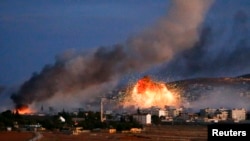Syrian Kurdish leaders are pushing back on Turkey’s plan to allow Kurdish Peshmerga forces from northern Iraq to transit Turkish territory and to enter the besieged Syrian border town of Kobani to help in its defense.
Mideast politics is notoriously complex and among the most Byzantine involves the Kurdish political parties who vie for top-dog status and compete for the loyalty of all Kurds across Turkey, Iraq, Syria and Iran.
That competition appears to be coming to a head following Turkish officials announcing Monday they would allow Iraqi Kurds to cross Turkey to support the Syrian Kurdish city of Kobani. Now in its fifth week of a siege by militants of the Islamic State, some analysts argue the arrival of Peshmerga forces in Kobani would be a game-changer.
Resistance grows
But Syrian Kurdish leaders are now pushing back on the Turkish idea, saying it is not a done deal and they should have been consulted before the announcement.
In an interview with VOA, the spokesman for Kobani Kurds, Idriss Nassan, said Kobani Kurdish approval should have been secured first.
“From the beginning of these clashes we declared that any forces that want to come to Kobani to help in the resisting of Kobani there must be some coordination with the democratic autonomous administration because you know there is an administration, without the coordination its impossible to come to Kobani,” he said.
Monday’s announcement of the Turkish plan came after intense U.S. and European pressure on Ankara to allow Kurdish reinforcements into Kobani, said European diplomats. Without a relief force, French and German politicians warned they might have to consider arming the Kurdish defense forces, or YPG, who are controlled by the Democratic Union Party, or PYD, the dominant party in Syria’s Kurdistan.
The PYD is an offshoot of Turkey’s outlawed Kurdish separatist Kurdistan Workers’ Party, or PKK, which is at loggerheads with Iraqi Kurds.
Kurdish factions
The announcement the Peshmerga would be allowed to transit Turkey to help defend Kobani is seen by the PKK as a move by Ankara to alter the political dynamic in Syria’s Kurdistan and to undermine the dominance of the PYD. Iraqi Kurds, who enjoy good relations with Ankara, and agree with the Turks that an autonomous Syria Kurdistan should not be established.
Asked if Peshmerga forces, ideological rivals of the YPG, could arrive today or tomorrow or this week, Idriss Nassan appeared offhand and dismissive in his response.
“I do not have any specific information about the coming or not coming of the Peshmerga. It is just some declaration of the foreign minister, the Turkish foreign minister,” he said.
While many Kobani refugees are pleased with the Turkish announcement, some expressed disapproval.
Bozan, a farmer, said America is so powerful it alone could stop the Islamic militants and he wished U.S. airstrikes had started earlier.
U.S. airstrikes along with stubborn YPG resistance have stalled the offensive of the Islamic militants on Kobani, but the situation in the city is still precarious.












